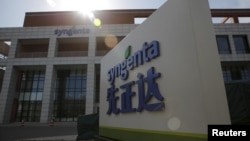Something dramatic is happening with China's "Go Global" strategy, with Chinese companies investing more money in foreign locations in the first 10 weeks of 2016 compared to all of last year. Chinese companies invested $110 billion until mid-April, compared to $108 billion in 2015.
This year could end with Chinese companies investing more than double what they did in 2015, analysts say. This would mean nearly seven times the growth compared to 2015, when China's foreign investments in the non-financial sector rose by 14.7 percent, according to the Ministry of Commerce.
Consulting firm Dealogic estimates that China might surpass the United States as the world's biggest foreign investor by the end of the year if it continues to pour money into foreign locations at the high pace seen in the first quarter. Chinese companies have struck 17 deals this year valued at $1 billion, it said.
Chinese firms are shopping around for foreign companies for commercial reasons as well as their need to please government authorities. China is increasingly using investments as a diplomatic tool, analysts said. Bilateral meetings usually feature promises of Chinese investments worth billions of dollars in different countries.
"Two forces are at work. The government encourages state-owned enterprises [SOE's] to invest abroad. Private companies have different reasons for investing abroad, but they also have the government's support behind them," Zhao Longkai, associate professor of finance at Peking University's Guanghua School of Management, told VOA.
"There is a lot of money floating around in China because the cost of capital is low. Also, acquiring foreign companies is a quick way to gain new markets and technology," he said.
A wide range of interests
Chinese investments cover a wide range of projects including some politically beneficial and sensitive ones like nuclear reactors, seaports connecting import oceanic routes like one in Sri Lanka, and the recent acquisition of Swiss pesticide and seed company Syngenta by China National Chemical Corp. for $43 billion in a cash offer.
The government's encouragement of investments is driven by foreign policy considerations, analysts said.
"Chinese investment now takes a top spot on the agenda of major diplomatic occasions as China is eager to counterbalance growing negativism about falling Chinese demand for foreign goods and China’s ballooning trade surplus," said a joint study by the Rhodium Group and MERICS. "Chinese diplomats also increasingly use the promise of investment and other financial flows as a diplomatic instrument to seek politically favorable outcomes in negotiations with the EU and its member states."
Zhou Xiaochuan, governor of the People's Bank of China, the central bank, said in a recent interview, "Chinese enterprises make more outbound investments than before as they 'go global.' This is a natural outcome of policy opening and a better understanding of the international market by Chinese entrepreneurs. Outbound investments have been growing rather rapidly, which is a good thing," he said.
China accounted for 10 percent of global foreign direct investment by the end of 2015, but this might double in the next few years. The Rhodium Group and MERICS estimated Chinese foreign investments might grow to over $1 trillion in the next five years.
A publication of the State Council, the country's Cabinet, said last April that China was implementing the fourth stage of its "Go Global" strategy.
"Now, with “Go Global” era 4.0 coming, private enterprises become the main driving forces, with investment diversity and upgrade of their position within global value chains," it said.
It added, "With its economy entering the state of New Normal, China is witnessing two dramatic changes: from a capital importing country to a capital exporting country; from 'world factory' to 'world market.'"




